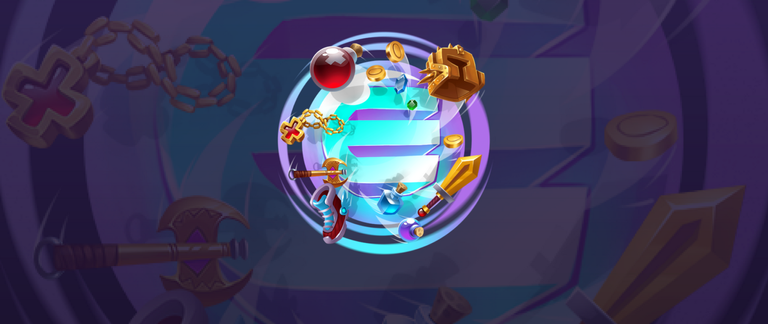
Original Article On Medium Here
01 — Acquisition
At this point in time, game developers are able to acquire Enjin Coin in two ways:
An official partnership with Enjin.
Purchase from a cryptocurrency exchange.
Our whitepaper states that 10% of all tokens is reserved for marketing and strategic partners; 100m Enjin Coins will be used to incentivise partnerships. Once those supplies run out, the only way game developers will be able to acquire Enjin Coin is via cryptocurrency exchanges — which might be interesting to our long-term investors.
02 — Minting
“Minting” is just a nifty term for “Turning Enjin Coin into custom tokens”.
Game developers might mint in-game currencies, items such as swords, guns, tanks, plots of land, planets. Essentially, any object in the game, or even the game itself can be minted.
Basically, every minted digital asset has real-life value. Enjin Coin is used to create it.
The most important variable (in-game economy design vise) when minting a large volume of in-game items (currencies, or mineable resources, for example) is the supply model. Efinity, our upcoming game channel network, will support six different token supply models, in order to meet the needs of game developers in regards to the game economy design
03 — Gaming
There are a couple of ways gamers can acquire Enjin Coin-based digital assets:
In-Game Rewards
- finishing a quest and getting a sword
- referring a friend and earning a bit of in-game currency
- cutting down a tree and ending up with a tokenized branch with which you can craft a bow
Purchases
- either in-game and/or via official marketplaces from game developers
- peer-to-peer, directly or via approved, regulated secondary marketplaces
04 — Trading
Enjin Coin-based virtual items earned or purchased by gamers are not kept on the game servers — they are held safely in their private, secure Enjin Wallets.
Every trade transaction, whether it’s trading items for items, or Enjin Coin for items, will have to be confirmed by a gamer via his or hers Enjin Wallet.
Efinity will support escrow of multiple tokens — which, combined with trade confirmations, will result in a layer of security that should eliminate most, if not all types of scams in multiplayer games.
I feel that it’s important to make a difference between an items intrinsic value and it’s Enjin Coin-backed value. A wizard's staff might have only 10$ worth of Enjin Coin-backed value — but it could be sold for hundreds or thousands of times more. It all depends on its utility, rarity and/or other game-specific variables.
The intrinsic value of a tokenized item could depend solely on it’s creator — consider a famous Twitch streamer that crafted an enchanted sword, a talented artist that created a skin for a rifle or a real-life architect that built a magnificent castle.
Those types of ENJ-backed items will be possible due to token bundles — again, one of Efinity’s features. Token bundles will allow for compound items: crafting a sword from 10 pieces of steel that has 0.1 ENJ in backed value each, and ending up with a sword that has 1 ENJ in backed value.
Enjin Coin’s second development update introduced two nifty features : whitelists and bound tokens, which, when combined, can allow game developers to regulate (or obliterate) secondary marketplaces, and apply a trading fee on all marketplace transactions.
As game developers lose up to 40% of their revenue on gray marketplace trading, this seems like a useful value proposal and an innovative monetization model.
Step 05 — Melting
Gamers can obtain Enjin Coin (ENJ) in several ways:
- By “melting” ENJ-based virtual items.
- Purchasing Enjin Coin via a cryptocurrency exchange.
“Melting” is a term used to describe turning Enjin Coin-backed virtual items back into Enjin Coin. The process is the exact reverse of minting, basically, with one key difference — the percentage of Enjin Coin that can be acquired by melting an item.
The percentage depends solely on the choices made by the game developer that minted the item — and it can never be less than 50%. (eg. a sword that was minted with 2 ENJ, then melted — a game developer would receive 1 ENJ, the gamer would receive 1ENJ).
One thing you should understand about melting is that it’s the absolute worst scenario — it means that the digital items intrinsic value is less than it’s ENJ-backed value.
That said, the melting feature does provide a sort of an “insurance”, and will provide an incentive for a vast majority of gamers to purchase in-game items which they wouldn’t get otherwise. Additionally providing an ethical way to implement microtransactions.
Purchasing cryptocurrencies is currently a complicated process, so our long-term plans are to enable seamless fiat-to-crypto conversion (and vise-versa) inside the Enjin Wallet itself — thus providing gamers with an easy interface to cash-in and cash-out.
Other Use-Cases
Minting ENJ-based items is not limited to game developers — there are several other use-cases in the gaming industry. Minecraft communities will be able to implement Enjin Coin via our Minecraft plugin, for example in order to sell ranks, subscriptions and items, or enable their members to earn ENJ in-game or via online forums, as engagement rewards.
Other types of organizations and individuals that might use Enjin Coin to mint custom items are esports teams, gaming guilds & clans and gaming influencers — use-cases typically revolve around incentivising engagement and retaining fans or community members by rewarding them with custom minted digital assets — branded coins, limited-edition items and similar stuff.
The infographic puts a focus on game developers, and for a good reason — the use-case is easiest to explain and understand, and they are our primary audience, after all.
The Meta-Economy
Let’s take a step back and look at the picture as a whole.
The economy ecosystem revolving around Enjin Coin will involve cryptocurrency investors, game developers, gaming organizations and gamers.
Investors are likely to trade (from day trading to long-term hodling) Enjin Coin in order to profit. Once Enjin Coin partnership pool is depleted, the only way game developers and gaming organizations will be able to obtain large quantities of ENJ is by purchasing it thus providing an incentive for investors.
At this point, I do have to notice that Enjin Coin investors community (10k strong on Telegram), especially the long-term hodlers, invested for ideological reasons as well — they believe in our mission.
Game developers will be acquiring Enjin Coin for three main reasons — it’s problem-solving capability, the ability to increase revenue, and the wondrous game design possibilities it will open.
Gaming organizations such as esports teams, gaming guilds, clans and communities might acquire Enjin Coin to monetize their servers, or increase engagement and growth.
Gamers will be both selling and buying Enjin Coin — first group to make a profit, second to use it for in-game purchases. I can’t be 100% sure at this point in time, but if I had to guess, I’d say that gamers using Enjin Coin will adopt some of the cryptocurrency lingo — words like “hodl”, for example.
The infographic should actually be a circle — an endless loop of buying, minting, earning, trading and selling.
I find the whole ecosystem beautiful in it’s insane complexity and ethereal simplicity.
I hope that you’ve gained a better understanding of Enjin Coin — leave a comment if you have any questions.
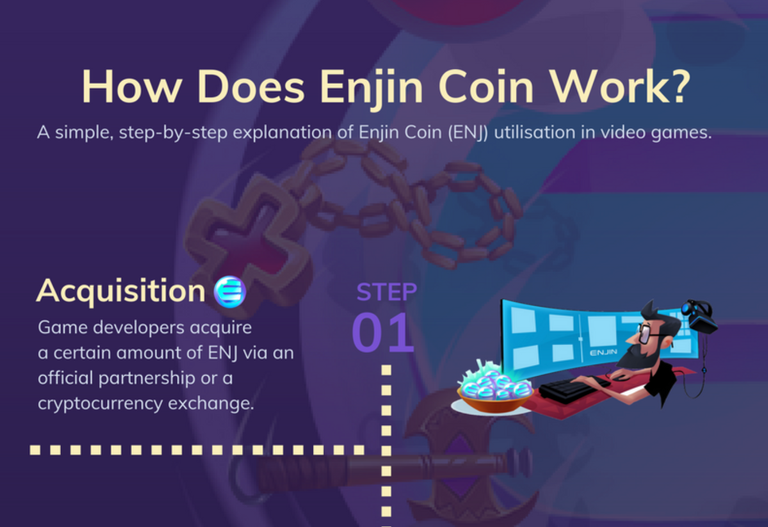
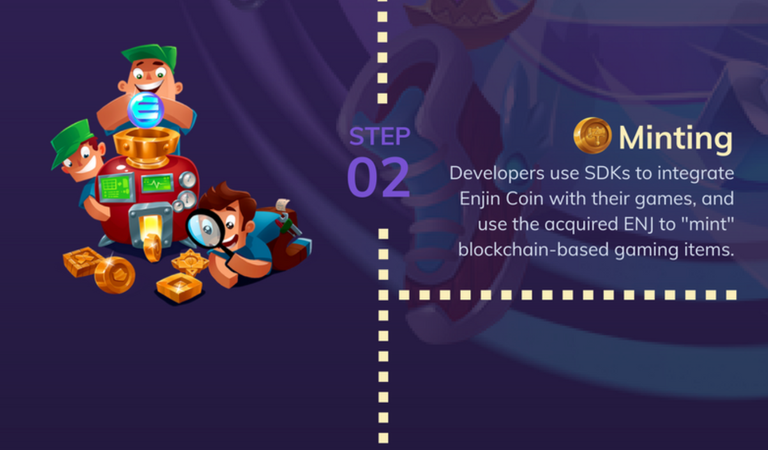
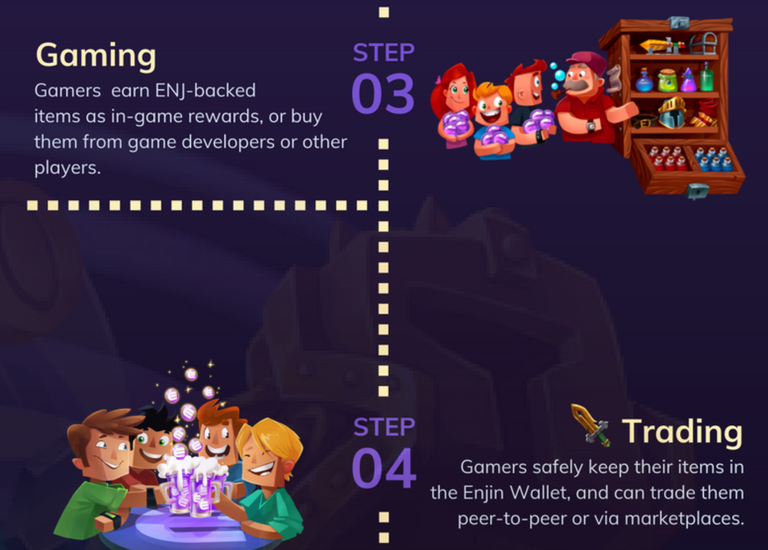
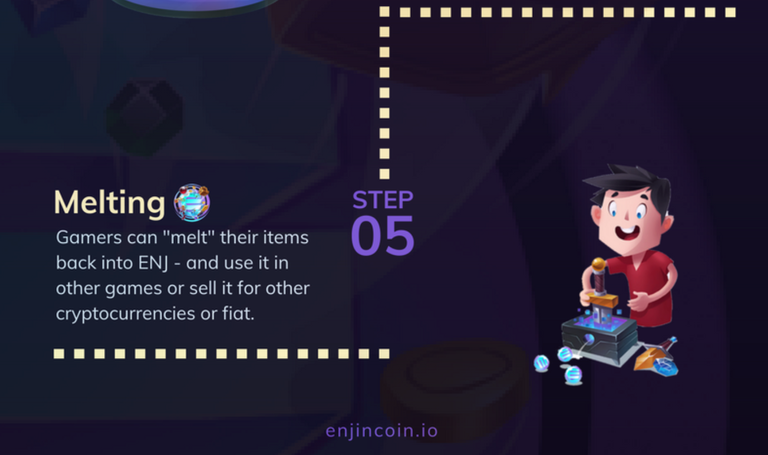
Resources
Hi! I am a robot. I just upvoted you! I found similar content that readers might be interested in:
https://blog.enjincoin.io/how-does-enjin-coin-work-c305a7aa600e
Congratulations @enjincoin! You have completed some achievement on Steemit and have been rewarded with new badge(s) :
Click on the badge to view your Board of Honor.
If you no longer want to receive notifications, reply to this comment with the word
STOPDo not miss the last post from @steemitboard!
Participate in the SteemitBoard World Cup Contest!
Collect World Cup badges and win free SBD
Support the Gold Sponsors of the contest: @good-karma and @lukestokes